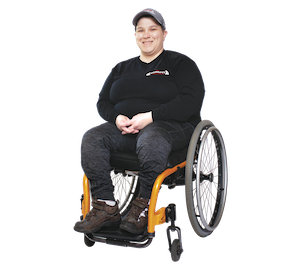CONNECT
Raising the Bar
Athlete presses ahead, focusing on one dream and then another
 PHOTO: Michael F. McElroy
PHOTO: Michael F. McElroyChelsi Figley's (SAS '18) mission is to counsel people with physical disabilities to be independent. She lives her philosophy every day. A mental-health counselor near Youngstown, Ohio, Figley also is a powerlifter with spina bifi da who can't use her legs and needs her trainer or coach to strap them to the bench before she lies down, grabs the thick metal bar above her head and pushes the load up. She's competed in national and international competitions and currently serves on the Team USA Olympic and Paralympic Athletes' Advisory Council.
Why powerlifting? How did that come about?I've been powerlifting for almost 10 years. I actually started going to the gym to lose weight. Then I realized that I really liked bench-pressing and found out it was a Paralympic event, and I wanted to be involved in the Paralympics. So I switched goals. I had grown up always watching the Olympics wishing I could be part of it.
Why did you take a leadership role on the Paralympics advisory council?I wanted to advocate for the athletes in general, and more specifically, for the Paralympic sports because there's not as much representation.
What's powerlifting's impact on you mentally and emotionally?I've always liked sports, but when I was growing up, I didn't have a lot of access to adaptive sports. The only thing I could do was to spectate or manage the girls volleyball and basketball teams. So [powerlifting] gave me a niche that I was good at that I'd never had. It's also something that I do that doesn't have anything to do with my [wheel]chair, because I'm not in it when I'm competing.
You often don't like when people call you an inspiration. Why is that?In the past, I had a really adverse emotional reaction to it. But now, it depends on the context. When people find out that I powerlift and was ranked 12th in the world [in 2014 in her weight class], then that's OK. But people come up to me in a grocery store when I'm grabbing a ketchup bottle off the shelf and tell me that I'm an inspiration. It affects me when people make a big deal about me doing very normal, everyday things. I don't understand it.
You had set your sights on the 2024 Paralympics, but recently decided to focus more on your career. Why is that?I missed several qualifying competitions over the last three years or so because of health issues that kept me home. It seemed like I would take months to ready for a qualifying competition and when it came around, I couldn't go. It was taking a toll on me mentally and emotionally, not to mention the physical wear and tear. I decided my body was telling me it was time for me to move on to the next phase of my life. I will definitely be on the advisory council through 2024.
Why did you choose CWRU and the online program?The online program was because I compete nationally and internationally and travel for competitions. I even did my bachelor's online [in social work at Liberty University]. Case Western [Reserve] was recommended to me by Becky Nelis (SAS '03), who I now work for [at Pathways of Ohio Counseling Services]. She did the on-campus social work program and got a lot out of it.
Did you have mentors at the university?Sonia Minnes [PhD, associate professor of social work and chair of the Mandel School's doctoral program] was a huge help and mentor to me. She was very instrumental in me being able to adapt the online program to work for my particular circumstances.
Where do you hope to take your mental-health counseling career?I would eventually like to give seminars for home-health caretakers and parents of people with disabilities, so that the caretakers understand the importance of independence.





